Premium Only Content
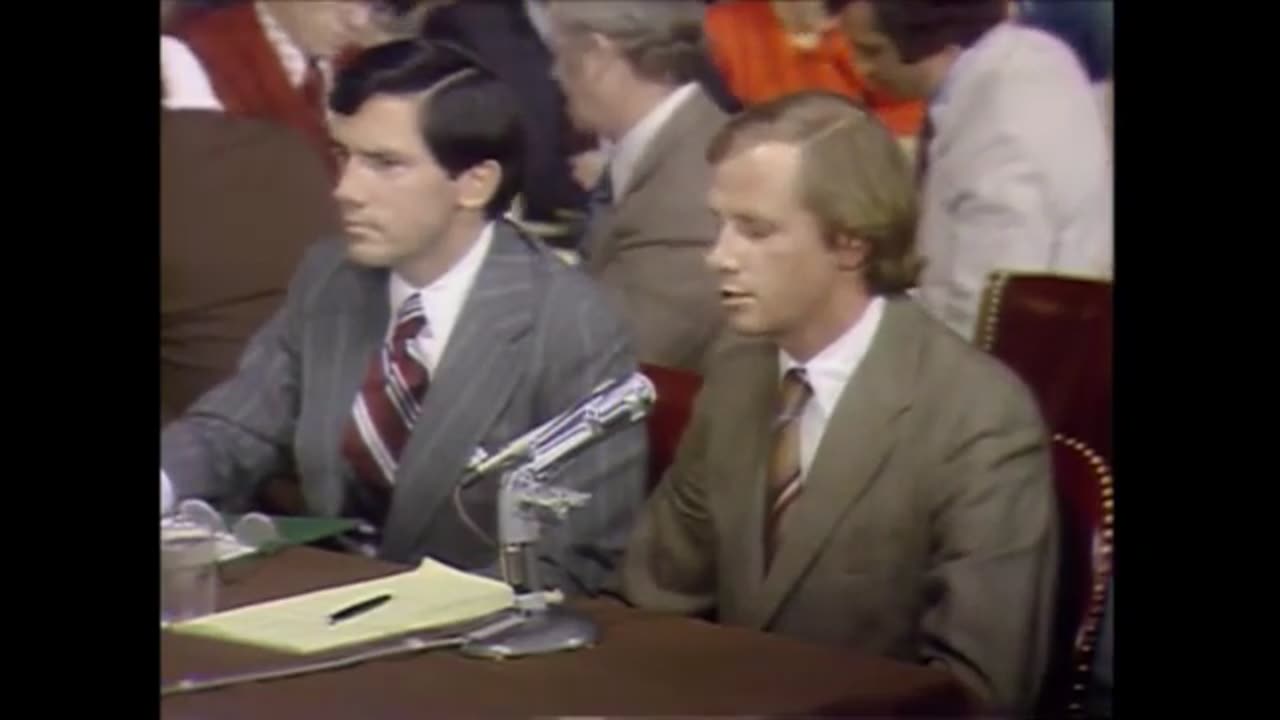
Watergate Hearings Day 26: Gordon Strachan (1973-07-23)
The dark side of history: https://thememoryhole.substack.com/
Gordon Creighton Strachan (born July 24, 1943) is an American attorney and political staffer who served as an aide to H.R. Haldeman, the chief of staff for President Richard Nixon and a figure in the Watergate scandal.
Early life and education
Strachan was born in Berkeley, California.[1] At University of Southern California, he was a member of Trojans for Representative Government with future Watergate scandal participants Dwight L. Chapin, Tim Elbourne, Donald Segretti, Herbert Porter, and Ron Ziegler. In 1965, he received a Bachelor of Arts degree in international relations from the University of Southern California.[citation needed] In 1968, received a Juris Doctor from the UC Berkeley School of Law.[citation needed]
Career
From 1968 until 1970 he worked for the New York City law firm of Mudge, Rose, Guthrie & Alexander, the same firm Nixon worked for before he ran again for the presidency in 1968.
Strachan (right) and Richard Nixon (left) in the Oval Office, circa 1971 during Nixon's Presidency
Strachan, who was recruited by Dwight Chapin, joined the White House Office in 1970 and initially worked as a staff assistant to Herbert G. Klein. He was assigned to be H. R. Haldeman's liaison to the Committee for the Re-Election of the President (CRP) when it was formed in March 1971. His duties at CRP focused on areas that he had previous experience with; as an advance man during 1970 mid-term election campaigns, he oversaw political operations. He testified as such before the United States Senate Watergate Committee and stated that John Dean oversaw all political intelligence-gathering, including the Watergate break-in, at CRP.
Strachan was indicted along with other White House staffers on March 1, 1974, but all charges against him were dropped on June 10, 1975.
He moved to Utah in 1975, and served as a clerk for Berman & Giauque in Salt Lake City. In 1977 his license to practice law was restored in Utah, and he was elevated to a lawyer at the firm, until he left for a partnership at Prince, Yeates & Geldzahler. He was a principal at the law firm, Strachan Strachan & Simon P.C., in Park City, Utah, but is now retired. His practice mainly focused on antitrust, personal injury and business litigation in the recreational sports industry. He served on the Olympic Organizing Committee for the 2002 Winter Games, and is also general counsel to the United States Ski and Snowboard Association.[citation needed] He is the author of several articles on law.
Sources
"Special Files: Gordon C. Strachan". Nixon Presidential Materials. Archived from the original on April 14, 2005. Retrieved March 7, 2005.
"Firm History". Strachan & Strachan P.C. Archived from the original on February 7, 2005. Retrieved March 7, 2005.
John Ehrlichman: In the Eye of the Storm, Hosted by Tom Clancy (1997) Video. ISBN 0-9665154-0-4
References
The Martindale-Hubbell Law Directory. Martindale-Hubbell Law Directory, Incorporated. 1999. ISBN 978-1-56160-324-4.
According to Thomas J. Johnson, a professor of journalism at University of Texas at Austin, Secretary of State Henry Kissinger predicted during Nixon's final days that history would remember Nixon as a great president and that Watergate would be relegated to a "minor footnote".[121]
When Congress investigated the scope of the president's legal powers, it belatedly found that consecutive presidential administrations had declared the United States to be in a continuous open-ended state of emergency since 1950. Congress enacted the National Emergencies Act in 1976 to regulate such declarations. The Watergate scandal left such an impression on the national and international consciousness that many scandals since then have been labeled with the "-gate suffix".
One of a variety of anti-Ford buttons generated during the 1976 presidential election: it reads "Gerald ... Pardon me!" and depicts a thief cracking a safe labeled "Watergate".
Disgust with the revelations about Watergate, the Republican Party, and Nixon strongly affected results of the November 1974 Senate and House elections, which took place three months after Nixon's resignation. The Democrats gained five seats in the Senate and forty-nine in the House (the newcomers were nicknamed "Watergate Babies"). Congress passed legislation that changed campaign financing, to amend the Freedom of Information Act, as well as to require financial disclosures by key government officials (via the Ethics in Government Act). Other types of disclosures, such as releasing recent income tax forms, became expected, though not legally required. Presidents since Franklin D. Roosevelt had recorded many of their conversations but the practice purportedly ended after Watergate.
Ford's pardon of Nixon played a major role in his defeat in the 1976 presidential election against Jimmy Carter.[96]
In 1977, Nixon arranged an interview with British journalist David Frost in the hope of improving his legacy. Based on a previous interview in 1968,[122] he believed that Frost would be an easy interviewer and was taken aback by Frost's incisive questions. The interview displayed the entire scandal to the American people, and Nixon formally apologized, but his legacy remained tarnished.[123] The 2008 movie Frost/Nixon is a media depiction of this.
In the aftermath of Watergate, "follow the money" became part of the American lexicon and is widely believed to have been uttered by Mark Felt to Woodward and Bernstein. The phrase was never used in the 1974 book All the President's Men and did not become associated with it until the movie of the same name was released in 1976.[124] The 2017 movie Mark Felt: The Man Who Brought Down the White House is about Felt's role in the Watergate scandal and his identity as Deep Throat.
The parking garage where Woodward and Felt met in Rosslyn still stands. Its significance was noted by Arlington County with a historical marker in 2011.[125][126] In 2017 it was announced that the garage would be demolished as part of construction of an apartment building on the site; the developers announced that the site's significance would be memorialized within the new complex.[127][128]
Purpose of the break-in
Despite the enormous impact of the Watergate scandal, the purpose of the break-in of the DNC offices has never been conclusively established. Records from the United States v. Liddy trial, made public in 2013, showed that four of the five burglars testified that they were told the campaign operation hoped to find evidence that linked Cuban funding to Democratic campaigns.[129] The longtime hypothesis suggests that the target of the break-in was the offices of Larry O'Brien, the DNC chairman.[citation needed][130] However, O'Brien's name was not on Alfred C. Baldwin III's list of targets that was released in 2013.[citation needed] Among those listed were senior DNC official R. Spencer Oliver, Oliver's secretary Ida "Maxine" Wells, co-worker Robert Allen and secretary Barbara Kennedy.[129]
Based on these revelations, Texas A&M history professor Luke Nichter, who had successfully petitioned for the release of the information,[131] argued that Woodward and Bernstein were incorrect in concluding, based largely on Watergate burglar James McCord's word, that the purpose of the break-in was to bug O'Brien's phone to gather political and financial intelligence on the Democrats.[citation needed] Instead, Nichter sided with late journalist J. Anthony Lukas of The New York Times, who had concluded that the committee was seeking to find evidence linking the Democrats to prostitution, as it was alleged that Oliver's office had been used to arrange such meetings. However, Nichter acknowledged that Woodward and Bernstein's theory of O'Brien as the target could not be debunked unless the information was released about what Baldwin heard in his bugging of conversations.[citation needed]
In 1968, O'Brien was appointed by Vice President Hubert Humphrey to serve as the national director of Humphrey's presidential campaign and, separately, by Howard Hughes to serve as Hughes' public-policy lobbyist in Washington. O'Brien was elected national chairman of the DNC in 1968 and 1970. In late 1971, the president's brother, Donald Nixon, was collecting intelligence for his brother at the time and asked John H. Meier, an adviser to Howard Hughes, about O'Brien. In 1956, Donald Nixon had borrowed $205,000 from Howard Hughes and had never repaid the loan. The loan's existence surfaced during the 1960 presidential election campaign, embarrassing Richard Nixon and becoming a political liability. According to author Donald M. Bartlett, Richard Nixon would do whatever was necessary to prevent another family embarrassment.[132] From 1968 to 1970, Hughes withdrew nearly half a million dollars from the Texas National Bank of Commerce for contributions to both Democrats and Republicans, including presidential candidates Humphrey and Nixon. Hughes wanted Donald Nixon and Meier involved but Nixon opposed this.[133]
Meier told Donald Nixon that he was sure the Democrats would win the election because they had considerable information on Richard Nixon's illicit dealings with Hughes that had never been released, and that it resided with Larry O'Brien.[134] According to Fred Emery, O'Brien had been a lobbyist for Hughes in a Democrat-controlled Congress, and the possibility of his finding out about Hughes' illegal contributions to the Nixon campaign was too much of a danger for Nixon to ignore.[135]
James F. Neal, who prosecuted the Watergate 7, did not believe Nixon had ordered the break-in because of Nixon's surprised reaction when he was told about it.[136]
Reactions
Australia
Australian Prime Minister Gough Whitlam referred to the American presidency's "parlous position" without the direct wording of the Watergate scandal during Question Time in May 1973.[137] The following day responding to a question upon "the vital importance of future United States–Australia relations", Whitlam parried that the usage of the word 'Watergate' was not his.[138] United States–Australia relations have been considered to have figured as influential when, in November 1975, Australia experienced its own constitutional crisis which led to the dismissal of the Whitlam Government by Sir John Kerr, the Australian Governor-General.[139] Max Suich has suggested that the US was involved in ending the Whitlam government.[140]
China
Chinese then-Premier Zhou Enlai said in October 1973 that the scandal did not affect the relations between China and the United States.[141] According to the then–Prime Minister Kukrit Pramoj of Thailand in July 1975, Chairman Mao Zedong called the Watergate scandal "the result of 'too much freedom of political expression in the U.S.'"[142] Mao called it "an indication of American isolationism, which he saw as 'disastrous' for Europe". He further said, "Do Americans really want to go isolationist? ... In the two world wars, the Americans came [in] very late, but all the same, they did come in. They haven't been isolationist in practice."[143]
Japan
In August 1973, then–Prime Minister Kakuei Tanaka said that the scandal had "no cancelling influence on U.S. leadership in the world". Tanaka further said, "The pivotal role of the United States has not changed, so this internal affair will not be permitted to have an effect."[144] In March 1975, Tanaka's successor, Takeo Miki, said at a convention of the Liberal Democratic Party, "At the time of the Watergate issue in America, I was deeply moved by the scene in the House Judiciary Committee, where each member of the committee expressed his own or her own heart based upon the spirit of the American Constitution. It was this attitude, I think, that rescued American democracy."[145]
Singapore
Then-Prime Minister Lee Kuan Yew said in August 1973 that the scandal may have led the United States to lessen its interests and commitments in world affairs, to weaken its ability to enforce the Paris Peace Accords on Vietnam, and to not react to violations of the Accords. Lee said further that the United States "makes the future of this peace in Indonesia an extremely bleak one with grave consequence for the contiguous states." Lee then blamed the scandal for economic inflation in Singapore because the Singapore dollar was pegged to the United States dollar at the time because Singapore had "unwisely" believed that the U.S. dollar was stronger than the British pound sterling.[146]
Soviet Union
In June 1973, when chairman Leonid Brezhnev arrived in the United States to have a one-week meeting with Nixon,[147] Brezhnev told the press, "I do not intend to refer to that matter—[the Watergate]. It would be completely indecent for me to refer to it ... My attitude toward Mr. Nixon is of very great respect." When one reporter suggested that Nixon and his position with Brezhnev were "weakened" by the scandal, Brezhnev replied, "It does not enter my mind to think whether Mr. Nixon has lost or gained any influence because of the affair." Then he said further that he had respected Nixon because of Nixon's "realistic and constructive approach to Soviet Union–United States relations ... passing from an era of confrontation to an era of negotiations between nations".[148]
United Kingdom
Talks between Nixon and Prime Minister Edward Heath may have been bugged. Heath did not publicly display his anger, with aides saying that he was unconcerned about having been bugged at the White House. According to officials, Heath commonly had notes taken of his public discussions with Nixon so a recording would not have bothered him. However, officials said that if Heath's private talks with Nixon were bugged, then he would have been outraged.[149]
Iran
Iranian then-Shah Mohammad Reza Pahlavi told the press in 1973, "I want to say quite emphatically ... that everything that would weaken or jeopardize the President's power to make decisions in split seconds would represent grave danger for the whole world."[144]
Kenya
An unnamed Kenyan senior official of Foreign Affairs Ministry accused Nixon of lacking interest in Africa and its politics and then said, "American President is so enmeshed in domestic problems created by Watergate that foreign policy seems suddenly to have taken a back seat [sic]."[144]
Cuba
Cuban then-leader Fidel Castro said in his December 1974 interview that, of the crimes committed by the Cuban exiles, like killings, attacks on Cuban ports, and spying, the Watergate burglaries and wiretappings were "probably the least of [them]".[150]
United States
After the fall of Saigon ended the Vietnam War, Secretary of State Henry Kissinger said in May 1975 that, if the scandal had not caused Nixon to resign, and Congress had not overridden Nixon's veto of the War Powers Resolution, North Vietnam would not have captured South Vietnam.[151] Kissinger told the National Press Club in January 1977 that Nixon's presidential powers weakened during his tenure, thus (as rephrased by the media) "prevent[ing] the United States from exploiting the [scandal]".[152]
The publisher of The Sacramento Union, John P. McGoff, said in January 1975 that the media overemphasized the scandal, though he called it "an important issue", overshadowing more serious topics, like a declining economy and an energy crisis.[153]
See also
List of American federal politicians convicted of crimes
Second-term curse
List of -gate scandals and controversies
Explanatory notes
Had the political process reached the most likely outcome, Nixon would have become the second U.S. president impeached by the House, after Andrew Johnson in 1868, and would also have become the first president to be removed from office following conviction in a Senate trial.
References
Perry, James M. "Watergate Case Study". Class Syllabus for "Critical Issues in Journalism". Columbia School of Journalism, Columbia University. Archived from the original on July 15, 2019. Retrieved July 27, 2018.
Dickinson, William B.; Cross, Mercer; Polsky, Barry (1973). Watergate: chronology of a crisis. Vol. 1. Washington, D.C.: Congressional Quarterly Inc. pp. 8, 133, 140, 180, 188. ISBN 0-87187-059-2. OCLC 20974031.
Rybicki, Elizabeth; Greene, Michael (October 10, 2019). "The Impeachment Process in the House of Representatives". CRS Report for Congress. Washington, D.C.: Congressional Research Service, Library of Congress. pp. 5–7. R45769. Archived from the original on January 22, 2020. Retrieved November 7, 2019.
"H.Res.74 – 93rd Congress, 1st Session". congress.gov. February 28, 1973. Archived from the original on December 30, 2019. Retrieved October 21, 2019.
"A burglary turns into a constitutional crisis". CNN. June 16, 2004. Archived from the original on November 26, 2020. Retrieved November 7, 2019.
"Senate Hearings: Overview". fordlibrarymuseum.gov. Archived from the original on July 2, 2017. Retrieved November 7, 2019.
"A burglary turns into a constitutional crisis". CNN. June 16, 2004. Archived from the original on November 30, 2020. Retrieved May 13, 2014.
"'Gavel-to-Gavel': The Watergate Scandal and Public Television". American Archive of Public Broadcasting. Retrieved November 10, 2019.
Manheim, Karl; Solum, Lawrence B. (Spring 1999). "Nixon Articles of Impeachment". Impeachment Seminar. Archived from the original on March 3, 2017.
"The Smoking Gun Tape" (Transcript of the recording of a meeting between President Nixon and H. R. Haldeman). Watergate.info website. June 23, 1972. Archived from the original on May 1, 2012. Retrieved January 17, 2007.
White, Theodore Harold (1975). Breach of Faith: The Fall of Richard Nixon. New York: Atheneum Publishers. p. 7. ISBN 0-689-10658-0. OCLC 1370091.
White (1975), Breach of Faith, p. 29. "And the most punishing blow of all was to come in late afternoon when the President received, in his Oval Office, the Congressional leaders of his party—Barry Goldwater, Hugh Scott and John Rhodes. The accounts of all three men agree. Goldwater averred that there were not more than fifteen votes left in support of him in the Senate."
Dash, Samuel (1976). Chief Counsel: Inside the Ervin Committee – The Untold Story of Watergate. New York: Random House. pp. 259–260. ISBN 0-394-40853-5. OCLC 2388043. "Soon Alexander Haig and James St. Clair learned of the existence of this tape and they were convinced that it would guarantee Nixon's impeachment in the House of Representatives and conviction in the Senate."
Bill Marsh (October 30, 2005). "Ideas & Trends – When Criminal Charges Reach the White House". The New York Times. Archived from the original on June 18, 2022. Retrieved September 30, 2014.
Ervin, Sam, et al., Final Report of the Watergate Committee.
Hamilton, Dagmar S. "The Nixon Impeachment and the Abuse of Presidential Power", In Watergate and Afterward: The Legacy of Richard M. Nixon. Leon Friedman and William F. Levantrosser, eds. Santa Barbara, CA: Greenwood Publishing Group, 1992. ISBN 0-313-27781-8
Smith, Ronald D. and Richter, William Lee. Fascinating People and Astounding Events From American History. Santa Barbara, CA: ABC-CLIO, 1993. ISBN 0-87436-693-3
Lull, James and Hinerman, Stephen. Media Scandals: Morality and Desire in the Popular Culture Marketplace. New York: Columbia University Press, 1997. ISBN 0-231-11165-7
Trahair, R.C.S. From Aristotelian to Reaganomics: A Dictionary of Eponyms With Biographies in the Social Sciences. Santa Barbara, CA: Greenwood Publishing Group, 1994. ISBN 0-313-27961-6
"El 'valijagate' sigue dando disgustos a Cristina Fernández | Internacional". El País. November 4, 2008. Archived from the original on July 2, 2017. Retrieved July 28, 2014.
Dean, John W. (2014). The Nixon Defense: What He Knew and When He Knew It. Viking. ISBN 978-0-670-02536-7.
"Watergate Retrospective: The Decline and Fall", Time, August 19, 1974
Meyer, Lawrence (November 10, 1988). "John N. Mitchell, Principal in Watergate, Dies at 75". The Washington Post. Archived from the original on August 30, 2008. Retrieved August 22, 2017.
Rugaber, Walter (January 18, 1973). "Watergate Trial in Closed Session". The New York Times. Archived from the original on April 24, 2018. Retrieved April 21, 2018.
"Alfred C. Baldwin". Spartacus Educational. Archived from the original on July 2, 2014. Retrieved April 4, 2021.
G Gordon Liddy ( 1980). Will, pp. 195, 226, 232, St. Martin's Press ISBN 978-0312880149
Pear, Robert (June 14, 1992). "Watergate, Then and Now – 2 Decades After a Political Burglary, the Questions Still Linger". The New York Times. Archived from the original on April 8, 2022. Retrieved May 18, 2015.
"Liddy Testifies in Watergate Trial". ABC News. Archived from the original on May 19, 2021. Retrieved May 22, 2021.
Brown, DeNeen (2017). "'The Post' and the forgotten security guard who discovered the Watergate break-in". The Washington Post. Archived from the original on June 24, 2019. Retrieved November 7, 2019.
Shirley, Craig (June 20, 2012). "The Bartender's Tale: How the Watergate Burglars Got Caught | Washingtonian". Washingtonian. Archived from the original on June 7, 2022. Retrieved March 31, 2020.
Lewis, Alfred E. (June 18, 1972). "5 Held in Plot to Bug Democrats' Office Here". The Washington Post. Archived from the original on June 22, 2011. Retrieved December 28, 2017.
"Bug Suspect Got Campaign Funds". The Washington Post. June 18, 2022. Archived from the original on June 18, 2022. "About 53 of these $100 bills were found on the five men after they were arrested at the Watergate."
Genovese, Michael A. (1999). The Watergate Crisis. Westport, CN: Greenwood Press. ISBN 978-0313298783.
Dickinson, William B.; Mercer Cross; Barry Polsky (1973). Watergate: Chronology of a Crisis. Vol. 1. Washington D. C.: Congressional Quarterly Inc. p. 4. ISBN 0-87187-059-2. OCLC 20974031.
Sirica, John J. (1979). To Set the Record Straight: The Break-in, the Tapes, the Conspirators, the Pardon. New York: Norton. p. 44. ISBN 0-393-01234-4.
"Transcript of a Recording of a Meeting Between The President And H.R. Haldeman in the Oval Office On June 23, 1972 From 10:04 To 11:39 a.m." (PDF). Richard Nixon Presidential Library and Museum. Archived (PDF) from the original on August 28, 2018. Retrieved September 10, 2018.
John M. Crewdson (August 6, 1974). "Nixon Ordered That the F.B.I. Be Told: 'Don't Go Any Further Into This Case'". The New York Times. Archived from the original on August 19, 2023. Retrieved September 24, 2023.
Brockell, Gillian. "'I'm a political prisoner': Mouthy Martha Mitchell was the George Conway of the Nixon era". The Washington Post. ISSN 0190-8286. Archived from the original on November 25, 2020. Retrieved November 17, 2020.
Cadden, Vivian (July 1973). "Martha Mitchell: the Day the Laughing Stopped" (PDF). The Harold Weisberg Archive. McCall's Magazine. Archived (PDF) from the original on June 22, 2020. Retrieved October 14, 2019.
Stein, Jeff (December 11, 2017). "Trump Ambassador Beat and 'Kidnapped' Woman in Watergate Cover-Up: Reports". Newsweek. Archived from the original on September 1, 2019. Retrieved September 12, 2019.
Reeves, Richard (2002). President Nixon : alone in the White House (1st Touchstone ed. 2002. ed.). New York: Simon & Schuster. pp. 511. ISBN 0-7432-2719-0.
McLendon, Winzola (1979). Martha: The Life of Martha Mitchell. Random House. ISBN 9780394411248.
"McCord Declares That Mrs. Mitchell Was Forcibly Held". The New York Times. February 19, 1975. Archived from the original on October 20, 2020. Retrieved September 12, 2019.
"Brief Timeline of Events". Malcolm Farnsworth. Archived from the original on May 19, 2012. Retrieved May 24, 2012.
"John N. Mitchell Dies at 75; Major Figure in Watergate". The New York Times. November 10, 1988. ISSN 0362-4331. Archived from the original on February 15, 2021. Retrieved January 25, 2017.
Meyer, Lawrence (November 10, 1988). "John N. Mitchell, Principal in Watergate, Dies at 75". The Washington Post. Archived from the original on August 30, 2008. Retrieved August 22, 2017.
Quote: "There were still simply too many unanswered questions in the case. By that time, thinking about the break-in and reading about it, I'd have had to be some kind of moron to believe that no other people were involved. No political campaign committee would turn over so much money to a man like Gordon Liddy without someone higher up in the organization approving the transaction. How could I not see that? These questions about the case were on my mind during a pretrial session in my courtroom on December 4." Sirica, John J. (1979). To Set the Record Straight: The Break-in, the Tapes, the Conspirators, the Pardon. New York: Norton. p. 56. ISBN 0-393-01234-4.
"Woodward Downplays Deep Throat" Archived June 19, 2012, at the Wayback Machine, Politico. blog, June 2012. Retrieved February 8, 2015
"The profound lies of Deep Throat" Archived February 2, 2017, at the Wayback Machine, The Miami Herald, republished in Portland Press Herald, February 14, 2012
"Covering Watergate: Success and Backlash". Time. July 8, 1974. Archived from the original on June 2, 2013. Retrieved July 24, 2011.
Crouse, Timothy (1973).The Boys on the Bus, Random House, p. 298
"The Nation: More Evidence: Huge Case for Judgment". Time. July 29, 1974. Archived from the original on May 21, 2013. Retrieved July 24, 2011.
"The Nixon Years: Down from the Mountaintop". Time. August 19, 1974. Archived from the original on May 21, 2013. Retrieved July 24, 2011.
"Watergate Scandal, 1973 Year in Review". United Press International. September 8, 1973. Archived from the original on July 22, 2010. Retrieved June 17, 2010.
"When Judge Sirica finished reading the letter, the courtroom exploded with excitement and reporters ran to the rear entrance to phone their newspapers. The bailiff kept banging for silence. It was a stunning development, exactly what I had been waiting for. Perjury at the trial. The involvement of others. It looked as if Watergate was about to break wide open." Dash, Samuel (1976). Chief Counsel: Inside the Ervin Committee – The Untold Story of Watergate. New York: Random House. p. 30. ISBN 0-394-40853-5. OCLC 2388043.
"Sequels: Nixon: Once More, with Feeling", Time, May 16, 1977
"April 30, 1973: Address to the Nation About the Watergate Investigations". Presidential Speeches – Richard M. Nixon Presidency. University of Virginia Miller Center. October 20, 2016. Archived from the original on August 10, 2023. Retrieved August 9, 2023.
Garay, Ronald. "Watergate". The Museum of Broadcast Communication. Archived from the original on June 5, 2018. Retrieved January 17, 2007.
Kranish, Michael (July 4, 2007). "Select Chronology for Donald G. Sanders". Boston Globe. Archived from the original on March 3, 2016. Retrieved February 21, 2020.
Noble, Kenneth (July 2, 1987). "Bork Irked by Emphasis on His Role in Watergate". The New York Times. Archived from the original on September 1, 2018. Retrieved May 26, 2009.
Pope, Rich (October 31, 2016). "Nixon, Watergate and Walt Disney World? There is a connection". Orlando Sentinel. Archived from the original on April 9, 2017. Retrieved April 8, 2017.
Apple, R.W. Jr. "Nixon Declares He Didn't Profit From Public Life". The New York Times. Archived from the original on September 7, 2001. Retrieved August 22, 2017.
"Question-and-Answer Session at the Annual Convention of the Associated Press Managing Editors Association, Orlando, Florida | The American Presidency Project". www.presidency.ucsb.edu. Archived from the original on July 16, 2019. Retrieved July 16, 2019. "Well, I am not a crook"
Kilpatrick, Carroll (November 18, 1973). "Nixon Tells Editors, 'I'm Not a Crook". The Washington Post. Archived from the original on November 30, 2013. Retrieved August 22, 2017.
John Herbers (November 2, 1973). "Nixon Names Saxbe Attorney General; Jaworski Appointed Special Prosecutor". The New York Times. ISSN 0362-4331. Archived from the original on December 29, 2022. Retrieved December 29, 2022.
"The Legal Aftermath Citizen Nixon and the Law". Time. August 19, 1974. Archived from the original on December 21, 2011. Retrieved July 24, 2011.
Theodore White. Breach of Faith: The Fall of Richard Nixon Archived April 27, 2009, at the Wayback Machine. Reader's Digest Press, Athineum Publishers, 1975, pp. 296–298
Bernstein, C. and Woodward, B. (1976).The Final Days, p. 252. New York: Simon & Schuster.
"Obituary: Hugh Scott, A Dedicated Public Servant". The Morning Call. July 26, 1994. Archived from the original on December 11, 2015. Retrieved December 8, 2015.
"GOP Leaders Favour Stepdown". The Stanford Daily. Associated Press. May 10, 1974. Archived from the original on February 3, 2017. Retrieved December 8, 2015.
Patricia Sullivan (June 24, 2004). "Obituary: Clayton Kirkpatrick, 89; Chicago Tribune Editor". The Washington Post. Archived from the original on December 11, 2015. Retrieved December 8, 2015.
"Time". Time. Vol. 103, no. 20. May 20, 1974. Archived from the original on January 4, 2010. Retrieved July 24, 2011.
"Time". Time. Vol. 103, no. 19. May 13, 1974. Archived from the original on January 17, 2010. Retrieved July 24, 2011.
Kutler, S. (1997). Abuse of Power, p. 247. Simon & Schuster.
"Transcript Prepared by the Impeachment Inquiry Staff for the House Judiciary Committee of a Recording of a Meeting Among the President, John Dean and H.R. Haldeman on March 21, 1973 from 10:12 to 11:55 am" (PDF). Archived (PDF) from the original on July 21, 2011. Retrieved July 24, 2011.
Kutler, S. (1997). Abuse of Power, p. 111. Simon & Schuster, Transcribed conversation between President Nixon and Haldeman.
Clymer, Adam (May 9, 2003). "National Archives Has Given Up on Filling the Nixon Tape Gap". The New York Times. Archived from the original on May 27, 2015. Retrieved January 17, 2007.
1974 Congressional Record, Vol. 120, Page H2349 -50
1974 Congressional Record, Vol. 120, Page H2362 -63
1974 Congressional Record, Vol. 120, Page H29219
Bazan, Elizabeth B (December 9, 2010), "Impeachment: An Overview of Constitutional Provisions, Procedure, and Practice", Congressional Research Service reports
""Transcript of a Recording of a Meeting Between the President and H.R. Haldeman in the Oval Office on June 23, 1972 from 10:04 to 11:39 am" Watergate Special Prosecution Force" (PDF). Archived (PDF) from the original on May 28, 2010. Retrieved June 17, 2010.
""Audio: Recording of a Meeting Between the President and H.R. Haldeman in the Oval Office on June 23, 1972 from 10:04 to 11:39 am" Watergate Special Prosecution Force". Archived from the original on January 14, 2021. Retrieved November 26, 2015 – via YouTube.
Statement Announcing Availability of Additional Transcripts of Presidential Tape Recordings Archived March 4, 2016, at the Wayback Machine August 5, 1974
Bernstein and Woodward (1976): The Final Days, p. 309
"The Administration: The Fallout from Ford's Rush to Pardon". Time. September 23, 1974. Archived from the original on May 21, 2013. Retrieved July 24, 2011.
Katharine Graham, Personal History (New York: Alfred A. Knopf, 1997), p. 495.
Bart Barnes (August 26, 2003). "John J. Rhodes Dies; Led GOP In House During Watergate". The Washington Post. Archived from the original on March 6, 2019. Retrieved March 3, 2019.
Schmidt, Steffen W. (2013), American Government and Politics Today, 2013–2014 Edition, Wadsworth Publishing, p. 181, ISBN 978-1133602132, "In 1974, President Richard Nixon resigned in the wake of a scandal when it was obvious that public opinion no longer supported him."
"President Nixon's Resignation Speech". PBS. Archived from the original on July 18, 2011. Retrieved August 29, 2009.
"August 8, 1974: Address to the Nation Announcing Decision To Resign the Office of President". Presidential Speeches – Richard M. Nixon Presidency. University of Virginia Miller Center. October 20, 2016. Archived from the original on August 10, 2023. Retrieved August 9, 2023.
Brokaw, Tom (August 6, 2004). "Politicians come and go, but rule of law endures". NBC News. Archived from the original on January 14, 2021. Retrieved August 29, 2009.
"Gerald Ford's Proclamation Granting a Pardon to Richard Nixon". Ford.utexas.edu. Archived from the original on June 6, 2010. Retrieved June 17, 2010.
Ford, Gerald (September 8, 1974). "Gerald R. Ford Pardoning Richard Nixon". Great Speeches Collection. The History Place. Archived from the original on May 1, 2011. Retrieved December 30, 2006.
Fulton, Mary Lou (July 17, 1990). "Nixon Library : Nixon Timeline". Los Angeles Times. p. 2. Archived from the original on August 12, 2014. Retrieved July 28, 2014.
Shane, Scott (December 29, 2006). "For Ford, Pardon Decision Was Always Clear-Cut". The New York Times. p. A1.
Gettlin, Robert; Colodny, Len (1991). Silent Coup: The Removal of a President. New York: St. Martin's Press. p. 420. ISBN 0-312-05156-5. OCLC 22493143.
Ford, Gerald R. (1979). A Time to Heal: The Autobiography of Gerald R. Ford. San Francisco: Harper & Row. pp. 196–199. ISBN 0-06-011297-2. OCLC 4835213.
Ford (1979), 4.
Anita L. Allen, The New Ethics: A Tour of the 21st Century Landscape (New York: Miramax Books, 2004), 101.
Thomas L. Shaffer & Mary M. Shaffer, American Lawyers and Their Communities: Ethics in the Legal Profession (Notre Dame: University of Notre Dame Press, 1991), p. 1.
Jerold Auerbach, Unequal Justice: Lawyers and Social Change in Modern America (New York: Oxford University Press, 1976), p. 301.
Time, March 11, 1974, "The Nation: The Other Nixon Men"
"Washington Post profile of Haldeman". The Washington Post. Archived from the original on August 14, 2014. Retrieved July 28, 2014.
Stout, David (February 16, 1999). "John D. Ehrlichman, Nixon Aide Jailed for Watergate, Dies at 73". The New York Times. Archived from the original on February 23, 2017. Retrieved February 20, 2017.
David Rohde (April 15, 1998). "Maurice Stans Dies at 90; Led Nixon Commerce Dept". The New York Times. Archived from the original on June 8, 2013. Retrieved December 5, 2017.
Time, June 24, 1977, "The Law: Watergate Bargains: Were They Necessary?"
"March 23, 1973: Watergate Burglars Sentenced; McCord Letter Revealed". History Commons. Archived from the original on October 6, 2014. Retrieved September 30, 2014.
Jennie Cohen (June 15, 2012). "Watergate: Where Are They Now?". History. Archived from the original on October 6, 2014. Retrieved September 30, 2014.
"E. Howard Hunt Biography Writer, Spy (1918–2007)". Bio. Archived from the original on October 6, 2014. Retrieved September 30, 2014.
Albin Krebs & Robert McG. Thomas Jr. (January 28, 1982). "Notes on People – Bernard Barker to Retire From Miami Job Early". The New York Times. Archived from the original on October 6, 2014. Retrieved September 30, 2014.
Jilian Fama & Meghan Kiesel (June 17, 2012). "Watergate Burglars: Where Are They Now?". ABC. Archived from the original on October 6, 2014. Retrieved September 30, 2014.
Theodore Schneyer, "Professionalism as Politics: The Making of a Modern Legal Ethics Code", Archived April 24, 2023, at the Wayback Machine in Lawyers' Ideals/Lawyers' Practices: Transformations in the American Legal Profession, eds. Robert L. Nelson, David M. Trubek, & Rayman L. Solomon, 95–143 (Ithaca: Cornell University Press, 1992), 104.
Preamble Archived November 6, 2018, at the Wayback Machine, Model Rules of Professional Conduct (Chicago: American Bar Association, 2020), at ¶¶ 10–12.
American Bar Association (2015). "Standard 303, Curriculum" (PDF). ABA Standards and Rules of Procedure for Approval of Law Schools 2015–2016. Chicago: American Bar Association. p. 16. ISBN 978-1-63425-352-9. Archived (PDF) from the original on December 21, 2016. Retrieved December 15, 2016.
"Historian's work gives a glimpse of Nixon "unplugged"". University of Wisconsin-Madison. November 8, 2011. Archived from the original on September 30, 2014. Retrieved September 30, 2014.
"Nixon's secret Watergate testimony ordered released" Archived March 3, 2023, at the Wayback Machine, Reuters, July 29, 2011
Kim Geiger (November 10, 2011). "Nixon's long-secret grand jury testimony released". Los Angeles Times. Archived from the original on November 11, 2011. Retrieved November 10, 2011.
"Long-sealed Watergate documents may be released Associated Press reprinted by Fox News June 2, 2012". Fox News. June 2, 2012. Archived from the original on May 23, 2014. Retrieved July 28, 2014.
"Fed'l Judge Unseals Watergate Trial Records for G. Gordon Liddy and James McCord ABA Journal November 2, 2012". Abajournal.com. November 2, 2012. Archived from the original on October 6, 2014. Retrieved July 28, 2014.
Thomas J. Johnson, Watergate and the Resignation of Richard Nixon: Impact of a Constitutional Crisis, "The Rehabilitation of Richard Nixon", eds. P. Jeffrey and Thomas Maxwell-Long: Washington, D.C., CO. Press, 2004, pp. 148–149.
"The Nation: David Can Be a Goliath". Time. May 9, 1977. Archived from the original on January 14, 2021. Retrieved January 15, 2015.
Stelter, Brian (September 1, 2013). "David Frost, Interviewer Who Got Nixon to Apologize for Watergate, Dies at 74". The New York Times. Archived from the original on February 23, 2015. Retrieved November 25, 2014.
"Follow The Money: On The Trail Of Watergate Lore", NPR, June 16, 2012
"Historical Marker Installed Outside 'Deep Throat' Garage". August 17, 2011. Archived from the original on November 6, 2018. Retrieved January 23, 2018.
"Watergate Investigation Historical Marker". Archived from the original on January 24, 2018. Retrieved January 23, 2018.
Lewis, Danny. "The Parking Garage Where Deep Throat Spilled the Beans on Watergate Is Being Torn Down". Archived from the original on March 3, 2018. Retrieved January 23, 2018.
Maher, Kris (June 20, 2014). "Watergate Parking Garage to Be Torn Down". The Wall Street Journal. Archived from the original on January 24, 2018. Retrieved January 23, 2018.
Jessica Gresko, Associated Press (July 16, 2013). "Watergate Records Released 40 Years After Being Filed Under Seal". HuffPost. Archived from the original on December 26, 2013. Retrieved September 6, 2014.
Greenberg, David (June 5, 2005). "The Unsolved Mysteries of Watergate". The New York Times. Archived from the original on June 23, 2013. Retrieved February 20, 2017.
Senior Judge Royce Lamberth (June 11, 2013). "In Re: Petition of Luke Nitcher" (PDF). United States District Court for the District of Columbia. Archived from the original (PDF) on September 10, 2014. Retrieved September 9, 2014.
Donald L. Bartlett, Howard Hughes, p. 410, W. W. Norton & Co., 2004 ISBN 978-0-393-32602-4
Charles Higham Howard Hughes, p. 244, Macmillan, 2004 ISBN 978-0-312-32997-6
DuBois, Larry, and Laurence Gonzales (September 1976). "Hughes, Nixon and the C.I.A.: The Watergate Conspiracy Woodward and Bernstein Missed", Playboy
Fred Emery Watergate, p. 30, Simon & Schuster, 1995 ISBN 978-0-684-81323-3
"The Nation: It Goes Back to the Big Man Time Magazine January 13, 1975 issue". Time. January 13, 1975. Archived from the original on January 22, 2011. Retrieved July 28, 2014.
Hansard, May 30, 1973 [1] Archived September 29, 2019, at the Wayback Machine
Hansard, May 31, 1973 [2] Archived October 2, 2019, at the Wayback Machine
"Unholy Fury review". The Sydney Morning Herald. May 15, 2015. Archived from the original on August 10, 2017. Retrieved August 7, 2017.
Suich, Max (November 3, 2014). "Whitlam death revives doubts of US role in his sacking". Australian Financial Review. Archived from the original on September 29, 2019. Retrieved September 29, 2019.
Sulzberger, C. L. (October 30, 1973). "The Thoughts of Premier Chou". St. Petersburg Times. The New York Times Service. p. 4–A. Archived from the original on January 14, 2021. Retrieved November 21, 2016 – via Google News.
"Mao Tse-tung Said to Hold Former Opinion of Nixon". Nashua Telegraph. Associated Press. July 10, 1975. p. 25. Archived from the original on January 14, 2021. Retrieved November 22, 2014.
Chamberlain, John (November 9, 1976). "Another Look at Mao Tse-tung". Ludington Daily News. p. 4. Archived from the original on April 21, 2020. Retrieved November 23, 2014 – via Google News Archive.
Freed, Kenneth J. (August 15, 1973). "Watergate and Its Effects on Foreign Affairs Discussed". Nashua Telegraph. Associated Press. p. 21. Archived from the original on January 14, 2021. Retrieved November 25, 2014.
Halloran, Richard (March 20, 1975). "Watergate Effects Abroad Are Slight". The New York Times. p. 13. Archived from the original on April 21, 2020. Retrieved November 25, 2014 – via Google News Archive.
"Watergate may sap U.S. power". The Gazette. Montreal. August 8, 1973. p. 2. Archived from the original on April 21, 2020. Retrieved November 23, 2014 – via Google News Archive.
Moseley, Ray (June 16, 1973). "Brezhnev to ignore Watergate in talks". Daily Record. Vol. 72, no. 142. Ellensburg, Washington. United Press International. p. 1. Archived from the original on January 14, 2021. Retrieved November 23, 2014.
"Brezhnev to Shun Talk of Watergate". The Milwaukee Journal. June 15, 1973. Part 1, page 3. Retrieved November 23, 2014 – via Google News Archive.[permanent dead link]
Gavshon, Arthur L. (July 18, 1973). "Britain's Leader Shows Restraint Over Bugging". The Lewiston Daily Sun. Archived from the original on January 14, 2021. Retrieved November 25, 2014 – via Google News Archive.
"Fidel says Watergate least of exiles' crimes". The Miami News. Reuters. December 2, 1974. p. 2A. Retrieved November 23, 2014 – via Google News Archive.[permanent dead link]
"The name-calling in the wake of defeat". New Straits Times. Malaysia. May 6, 1975. Archived from the original on January 14, 2021. Retrieved November 23, 2014 – via Google News Archive.
"Scandal Hurt Policy – Kissinger". The Pittsburgh Press. United Press International. January 11, 1977. p. A-4. Archived from the original on April 21, 2020. Retrieved November 21, 2016 – via Google News.
"Publisher criticizes the media". Lodi News-Sentinel. United Press International. January 30, 1975. Archived from the original on April 21, 2020. Retrieved October 24, 2015 – via Google News Archive.
Further reading
Graff, Garrett M. (February 15, 2022). Watergate: A New History. Simon and Schuster. ISBN 978-1-9821-3918-6. Archived from the original on August 17, 2022. Retrieved August 18, 2022.
Hersh, S, 1983, The Price of Power: Kissinger in the Nixon White House, Faber & Faber, London"FBI Records: Watergate". The Vault. Federal Bureau of Investigation. Archived from the original on May 12, 2013. Retrieved November 7, 2014.
"Working Draft: A CIA Watergate History". CIA's Office of the Inspector General. Archived from the original on September 5, 2016. Retrieved September 5, 2016.
"Nixon Grand Jury Records". United States National Archives. 1972–1979. Archived from the original on January 12, 2012. Retrieved January 13, 2012.
"Records of the Watergate Special Prosecution Force". United States National Archives. 1971–1977. Archived from the original on November 6, 2011. Retrieved January 13, 2012.
Campbell, W. Joseph (June 16, 2012). "Five media myths of Watergate". BBC. Archived from the original on November 12, 2014. Retrieved November 7, 2014.
Doyle, James (1977). Not Above the Law: the battles of Watergate prosecutors Cox and Jaworski. New York: William Morrow and Company. ISBN 0-688-03192-7.
Hougan, Jim (1984). Secret Agenda. New York: Random House, Inc. ISBN 0-394-51428-9. This was the first book to question the orthodox narrative of The Washington Post.
O'Sullivan, Shane (2018). Dirty Tricks: Nixon, Watergate and the CIA. New York: Skyhorse Publishing. ISBN 978-1-510-72958-2. Archived from the original on December 20, 2019. Retrieved December 20, 2019.
"A New Explanation of Watergate", by J. Anthony Lukas, The New York Times, January 11, 1984.
Schudson, Michael (1992). Watergate in American memory: how we remember, forget, and reconstruct the past. New York: BasicBooks. ISBN 0-465-09084-2. OCLC 25131563.
Holland, Max (2012). Leak: Why Mark Felt Became Deep Throat. Lawrence, KN: University Press of Kansas. ISBN 978-0-7006-1829-3. OCLC 760979076.
White, Theodore Harold (1975). Breach of faith: the fall of Richard Nixon. New York: Atheneum Publishers. ISBN 0-689-10658-0. OCLC 1370091. A comprehensive history of the Watergate Scandal by Teddy White, a respected journalist and author of The Making of the President series.
Woodward, Bob and Bernstein, Carl wrote a bestselling book based on their experiences covering the Watergate Scandal for The Washington Post titled All the President's Men, published in 1974. A film adaptation, starring Robert Redford and Dustin Hoffman as Woodward and Bernstein respectively, was released in 1976.
Woodward, Bob; Bernstein, Carl (2005). The Final Days. New York: Simon & Schuster. ISBN 0-7432-7406-7. – contains further details from March 1973 through September 1974.
U.S. News Staff (August 8, 2014). "Watergate and the White House: The 'Third-Rate Burglary' That Toppled a President. Summarized key Watergate dates and details and its impact on President Richard Nixon by U.S. News". U.S. News & World Report. Archived from the original on October 24, 2016. Retrieved January 7, 2017 – via The Internet Archive, but originally published in U.S. News & World Report on August 19, 1974.
Rawson, Hugh (January 13, 2013). "Words of Watergate: A work about political vocabulary which offers lessons about the dangers of using deceptive language that remain relevant today by Hugh Rawson, director of Penguin USA's reference books operation". About Words - Cambridge Dictionary Blog. dictionaryblog.cambridge.org – A blog from Cambridge Dictionary. Archived from the original on August 5, 2017. Retrieved August 5, 2017 – via The Internet Archive.
Rawson, Hugh (January 28, 2013). "Words of Watergate: Part 2; A work about political vocabulary which offers lessons about the dangers of using deceptive language that remain relevant today by Hugh Rawson, director of Penguin USA's reference books operation". dictionaryblog.cambridge.org – A blog from Cambridge Dictionary. Archived from the original on August 5, 2017. Retrieved August 5, 2017 – via The Internet Archive.
Waldron, Lamar (2012). The Hidden History. Berkeley, California: Counterpoint publishers. ISBN 978-1-582-43813-9.
Hughes, Ken (2014). Chasing Shadows: the Nixon Tapes, the Chennault affair, and the origins of Watergate. Charlottesville and London: University of Virginia Press. ISBN 978-0-8139-3663-5.
External links
Wikimedia Commons has media related to Watergate scandal.
Wikiquote has quotations related to Watergate scandal.
Wikiquote has quotations related to Richard Nixon.
Washington Post Watergate Archive
Washington Post Watergate Tapes Online – The Washington Post
Watergate Trial Conversations – Richard Nixon Presidential Library and Museum
The Watergate Files, at the Gerald R. Ford Presidential Library, National Archives. Official and unofficial documents on the Watergate scandal from the Presidential collection of President Nixon's successor, Vice President Gerald R. Ford.
FBI Records: The Vault – Watergate at vault.fbi.gov
Watergate.info, Malcolm Farnsworth website owner
Watergate (Wikipedia article) is a five-part British documentary series by Brian Lapping Associates which interviewed most of the conspirators in 1994, still viewable online.
MacNeil, Robert; Lehrer, Jim (May 16, 2013). "Covering Watergate: 40 Years Later with MacNeil and Lehrer". PBS NewsHour (Interview). Interviewed by Jeffrey Brown. WETA-TV.
Watergate Collection
Image of women with children watching Senate Watergate Hearings on televisions in a Sears department store in Los Angeles, California, 1973. Los Angeles Times Photographic Archive (Collection 1429). UCLA Library Special Collections, Charles E. Young Research Library, University of California, Los Angeles.
vte
Richard Nixon
37th President of the United States (1969–1974) 36th Vice President of the United States (1953–1961) U.S. Senator from California (1950–1953) U.S. Representative for CA–12 (1947–1950)
Pre-presidency
Checkers speech Vice presidency
Presidential transition of Dwight D. Eisenhower 1958 motorcade attack Kitchen Debate Operation 40 Presidential transition of John F. Kennedy
Presidency
(timeline)
Transition First inauguration Second inauguration "Bring Us Together" Silent majority 1970 Lincoln Memorial visit State of the Union Address (1970 1973 1974) Wilson desk Judicial appointments
Supreme Court controversies Executive Orders Presidential Proclamations
Foreign policy
Nixon Doctrine Vietnam War
Cambodian bombing Paris Peace Accords "Peace with Honor" Vietnamization Cold War period
Linkage policy Tar Baby Option 1972 visit to China
Shanghai Communiqué 1973 Chilean coup d'état Détente
1972 Moscow Summit Anti-Ballistic Missile Treaty SALT I Treaty Prevention of Nuclear War Agreement Threshold Test Ban Treaty Operation CHAOS Space exploration
Economic policy
Bank Secrecy Act Fair Credit Reporting Act National Highway Traffic Safety Administration Urban Mass Transportation Act of 1970 Federal-Aid Highway Act of 1973 Nixon shock
Economic Stabilization Act of 1970 Smithsonian Agreement Occupational Safety and Health Act
National Institute for Occupational Safety and Health Occupational Safety and Health Administration Permissible exposure limit U.S. Consumer Product Safety Commission
Consumer Product Safety Act Lead-Based Paint Poisoning Prevention Act Poison Prevention Packaging Act of 1970 Public Health Cigarette Smoking Act Securities Investor Protection Act
Securities Investor Protection Corporation Tax Reform Act of 1969
Alternative minimum tax Revenue Act of 1971 Agricultural Act of 1970 Farm Credit Act of 1971 Consolidated Farm and Rural Development Act of 1972 Agriculture and Consumer Protection Act of 1973 Emergency Petroleum Allocation Act Emergency Daylight Saving Time Energy Conservation Act Trans-Alaska Pipeline Authorization Act
Environmental
policy
Council on Environmental Quality
Environmental Quality Improvement Act National Environmental Policy Act Environmental Protection Agency
Clean Air Amendments of 1970 Clean Water Act Federal Insecticide, Fungicide, and Rodenticide Act National Ambient Air Quality Standards National Emissions Standards for Hazardous Air Pollutants New Source Performance Standards Noise Control Act Reorganization Plan No. 3 of 1970 National Oceanic and Atmospheric Administration Coastal Zone Management Act
Coastal Zone Management Program Great Lakes Water Quality Agreement Marine Protection, Research, and Sanctuaries Act of 1972 Endangered Species Act of 1969 Endangered Species Act of 1973 Oil Pollution Act of 1973 Water Resources Development Act of 1974
Social policy
Family Assistance Plan Revised Philadelphia Plan Minority Business Development Agency Native American policy
Alaska Native Claims Settlement Act Education Amendments of 1972
Title IX National Cancer Act of 1971 End Stage Renal Disease Program Health Maintenance Organization Act of 1973 Drug Abuse Prevention and Control Act Shafer Commission War on Drugs
Drug Enforcement Administration Cannabis policy Federal Contested Elections Act Federal Election Campaign Act Voting Rights Act Amendments of 1970 District of Columbia Home Rule Act
Watergate
Timeline
Operation Sandwedge Operation Gemstone Saturday Night Massacre CRP White House Plumbers Watergate Seven Enemies List
list of opponents White House tapes United States v. Nixon (1974) Senate Watergate Committee
impeachment process "I am not a crook" Resignation
speech Pardon
Life and
politics
Richard Nixon Foundation Presidential Library and Museum Birthplace and boyhood home "Last press conference" Florida White House "La Casa Pacifica" Nixon Center Nixon v. General Services Administration (1977) Nixon v. Fitzgerald (1982) Death and state funeral
Books
Six Crises (1962) Bibliography
Elections
U.S. House of Representatives: 1946 1948 U.S. Senate: 1950 California gubernatorial election: 1962 GOP presidential primaries: 1960 1964 1968 1972 GOP national conventions: 1952 1956 1960 1968
campaign 1972 Presidential elections: 1952 1956 1960
debates 1968 1972
Popular
culture
"Nixon goes to China" Millhouse (1971 film) An Evening with Richard Nixon (1972 play) Richard (1972 film) Another Nice Mess (1972 film) Four More Years (1972 film) Impeach the President (1973 song) The Werewolf of Washington (1973 film) White House Madness (1975 film) All the President's Men (1976 film) The Public Burning (1977 novel) Washington: Behind Closed Doors (1977 miniseries) Secret Honor (1984 film) Nixon in China (1987 opera) The Final Days (1989 film) Nixon (1995 film) Elvis Meets Nixon (1997 film) Futurama (1999 TV series) Dick (1999 film) Nixon's China Game (2000 film) Dark Side of the Moon (2002 film) The Assassination of Richard Nixon (2004 film) Frost–Nixon interviews (2006 play, 2008 film) Black Dynamite (2009 film) "The Impossible Astronaut" (2011 TV episode) Our Nixon (2013 film) X-Men: Days of Future Past (2014 film) Crooked (2015 novel) Elvis & Nixon (2016 film) The Post (2017 film) Watergate (2019 board game) U.S. postage stamp
Related
Presidential Recordings and Materials Preservation Act Presidential Townhouse Richard Nixon mask
Staff
Jack Brennan (aide de camp) Murray Chotiner (early campaign manager) Manolo Sanchez (valet) Rose Mary Woods (secretary)
Family
Thelma "Pat" Ryan Nixon (wife) Tricia Nixon Cox (daughter) Julie Nixon Eisenhower (daughter) Christopher Nixon Cox (grandson) Jennie Eisenhower (granddaughter) Francis A. Nixon (father) Hannah Milhous Nixon (mother) Donald Nixon (brother) Edward Nixon (brother)
← Lyndon B. Johnson Gerald Ford →
← Alben W. Barkley Lyndon B. Johnson →
Category
vte
History of the United States
Timeline Outline
Events
Topics
Groups
Places
List of years Historiography Category Portal
vte
Special prosecutors and independent counsels of the U.S.
John B. Henderson and James Broadhead
Whiskey Ring William Cook
Star Route scandal Holmes Conrad and Charles Bonaparte
Post Office bribery Francis J. Heney
Oregon land fraud scandal Atlee Pomerene and Owen Roberts
Teapot Dome scandal Newbold Morris
DOJ corruption allegations Archibald Cox, Leon Jaworski, Henry S. Ruth Jr., and Charles Ruff
Watergate scandal Arthur Christy
Jordan drug allegations Paul J. Curran
Carter business loans Gerald Gallinghouse
Kraft drug allegations Leon Silverman
Donovan organized crime allegations Jacob Stein
Bechtel scandal James C. McKay and Alexia Morrison
Olson perjury Mike Seymour
Deaver perjury Morrison v. Olson Lawrence Walsh
Iran–Contra affair Carl Rauh and James Harper
Lawrence Wallace's taxes James C. McKay
Wedtech scandal Unknown
sealed Arlin Adams and Larry Thompson
Pierce HUD mismanagement Unknown
sealed Nicholas John Bua
Inslaw scandal Malcolm Richard Wilkey
House banking scandal Frederick Bernard Lacey
Iraqgate Joseph diGenova and Michael Zeldin
1992 Bush administration search of Clinton passport files Robert B. Fiske, Ken Starr, Robert Ray, and Julie Thomas
Whitewater controversy Starr Report Donald Smaltz
Espy trial David Barrett
Cisneros payments controversy Barrett Report Daniel Pearson
DOC trade mission controversy Curtis von Kann
Segal conflict of interest investigation Carol Elder Bruce
Wampumgate Ralph Lancaster
Herman corruption allegations John Danforth
Waco siege Patrick Fitzgerald
Plame affair Robert Mueller
2016 election interference allegations topics Mueller Report John Durham
Crossfire Hurricane FBI origins Jack Smith
2020 election obstruction efforts and Trump classified materials Robert K. Hur
Biden classified materials David C. Weiss
Hunter Biden investigation
Authority control databases Edit this at Wikidata
International
FAST
National
Spain France BnF data Germany Israel United States Japan Czech Republic
Other
NARA IdRef
Categories:
Watergate scandal1970s in the United States20th-century scandalsGovernment crisesNews leaksNixon administration controversiesPolitical scandals in the United StatesPolitical terminology of the United States1972 scandals1973 scandals1974 scandals1970s scandalsConstitutional crises
-
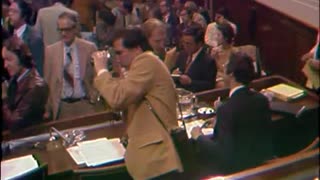 37:59
37:59
The Memory Hole
27 days agoNixon Impeachment Hearings Day 1 (1974-05-09)
624 -
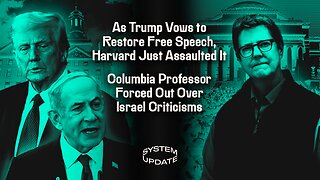 LIVE
LIVE
Glenn Greenwald
3 hours agoAs Trump Vows to Restore Free Speech, Harvard Just Assaulted It; Columbia Professor Forced Out Over Israel Criticisms | SYSTEM UPDATE #394
4,670 watching -
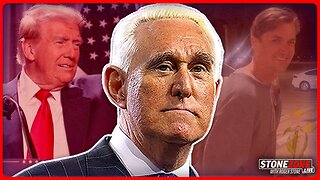 LIVE
LIVE
The StoneZONE with Roger Stone
23 minutes agoTrump Pardons Ross Ulbricht | The StoneZONE w/ Roger Stone
1,666 watching -
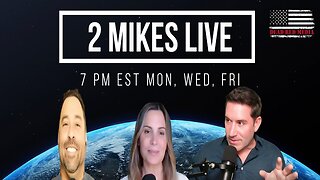 LIVE
LIVE
2 MIKES LIVE
9 hours ago2 MIKES LIVE #170 with special guest Rep. Buddy Carter (R-GA)
484 watching -
 7:09:22
7:09:22
Dr Disrespect
9 hours ago🔴LIVE - DR DISRESPECT - TRIPLE THREAT CHALLENGE - EXTREME EDITION
195K22 -
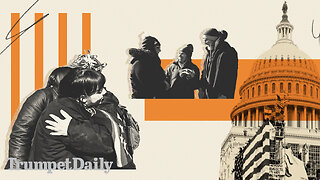 55:00
55:00
LFA TV
8 hours agoThe End of the January 6 Hoax | TRUMPET DAILY 1.22.25 7pm
10K2 -
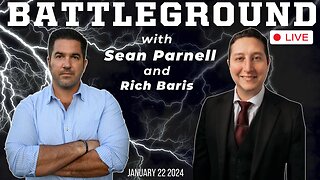 1:13:37
1:13:37
Battleground with Sean Parnell
6 hours agoPresident Trump Is On FIRE w/ Savage Rich Baris
154K17 -
 1:59:59
1:59:59
Melonie Mac
3 hours agoGo Boom Live Ep 34!
17.8K3 -
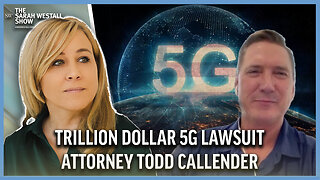 49:27
49:27
Sarah Westall
1 hour agoTrillion Dollar 5G Lawsuit, Project Archimedes, Mind Control & DEW Weapons w/Attorney Todd Callender
16.7K6 -
 53:11
53:11
Standpoint with Gabe Groisman
1 day agoTrump Is Crucial For Hostage Agreement Says Israeli Colonel
21.5K4